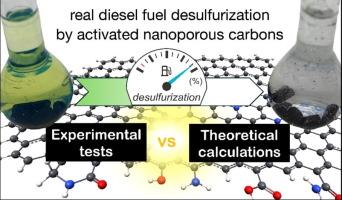融合实验和理论方法,了解纳米多孔碳对柴油的实际脱硫作用
IF 13.3
1区 工程技术
Q1 ENGINEERING, CHEMICAL
引用次数: 0
摘要
实验测试与理论计算相结合,对使用活化纳米多孔碳进行柴油燃料脱硫(rDeSulfur)产生了新的认识。这些碳因其不同的物理化学特性而被选中,并进一步经过化学处理以改变其表面化学性质,目的是研究主要物理化学特性对脱硫的影响。实验结果表明,多孔性和表面化学性质发挥着复杂的作用。具体来说,高度石墨化和孔径分布多样化增强了吸附能力,一些碳样品达到了超深度脱硫水平(<1 ppmwS)。理论计算表明,通过分散力形成的 π-π 堆叠是吸附的主要机制。虽然石墨烯边缘的表面功能性对相互作用强度的影响很小,但结构缺陷,特别是三个四价氮原子簇或带有 OH 基团的单个缺陷空位,提高了相互作用能量,与原始石墨烯相比提高了吸附效果。研究得出结论,碳在柴油脱硫中的有效性在很大程度上取决于石墨化程度、缺陷以及特定功能的位置。最后,虽然柴油中的苯、甲苯和萘等芳香族化合物会与噻吩类物质发生吸附竞争,但它们的相互作用能量较低,这表明硫化合物的吸附优于芳香族化合物。本文章由计算机程序翻译,如有差异,请以英文原文为准。

Merging experimental and theoretical approaches towards understanding real diesel fuel desulfurization by nanoporous carbons
Experimental tests combined with theoretical calculations have yielded new insights into real diesel fuel desulfurization (rDeSulfur) using activated nanoporous carbons. The carbons were selected for their varying physicochemical properties and further were chemically treated to modify their surface chemistry, aiming to investigate the impact of the major physicochemical features on rDeSulfur. The experimental findings demonstrated that both porosity and surface chemistry play complex roles. Specifically, a high degree of graphitization and diverse pore size distributions enhanced adsorptive capabilities, with some carbon samples achieving ultra-deep desulfurization levels (<1 ppmwS). Theoretical calculations indicated that π-π stacking through dispersion forces was the primary mechanism of adsorption. While surface functionalities at the edges of graphene had minimal impact on interaction strength, structural defects, especially clusters of three quaternary nitrogen atoms or single defected vacancy with OH group, improved interaction energies, boosting adsorption effectiveness compared to pristine graphene. The study concludes that the effectiveness of carbons in diesel desulfurization depends heavily on graphitization levels, defects, and where specific functionalities are located. Lastly, although aromatic compounds in diesel, like benzene, toluene, and naphthalene, compete with thiophenics for adsorption, they have lower interaction energies, suggesting preferential adsorption of sulfur compounds over the aromatics.
求助全文
通过发布文献求助,成功后即可免费获取论文全文。
去求助
来源期刊

Chemical Engineering Journal
工程技术-工程:化工
CiteScore
21.70
自引率
9.30%
发文量
6781
审稿时长
2.4 months
期刊介绍:
The Chemical Engineering Journal is an international research journal that invites contributions of original and novel fundamental research. It aims to provide an international platform for presenting original fundamental research, interpretative reviews, and discussions on new developments in chemical engineering. The journal welcomes papers that describe novel theory and its practical application, as well as those that demonstrate the transfer of techniques from other disciplines. It also welcomes reports on carefully conducted experimental work that is soundly interpreted. The main focus of the journal is on original and rigorous research results that have broad significance. The Catalysis section within the Chemical Engineering Journal focuses specifically on Experimental and Theoretical studies in the fields of heterogeneous catalysis, molecular catalysis, and biocatalysis. These studies have industrial impact on various sectors such as chemicals, energy, materials, foods, healthcare, and environmental protection.
 求助内容:
求助内容: 应助结果提醒方式:
应助结果提醒方式:


